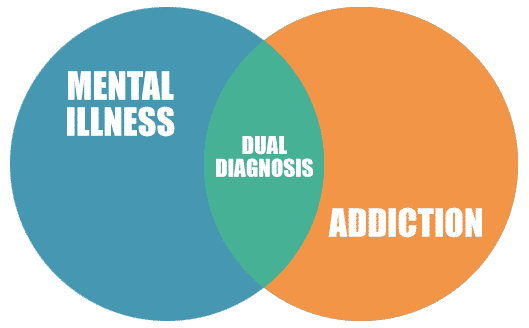Dual Diagnosis
Dual Diagnosis
According to SAMHSA’s 2014 National Survey on Drug Use and Health (NSDUH) approximately 7.9 million adults in the United States had co-occurring disorders in 2014.
Understanding Co-Occurring Disorders
Before the early 1990’s people who experienced symptoms of mental health issues, such as depressive episodes, mood swings, manic behavior, anxiety, were treated differently and separately from those who were in treatment for drug or alcohol abuse.
It wasn’t until recently that people started thinking that these conditions may be related and possibly co-occurring. Researchers discovered that an underlying psychological issue might drive drug and alcohol addiction. This discovery meant people who received a dual diagnosis of an addiction and a mental illness could get the finally get the help they needed.
Introducing Integrated Treatment
Almost 8.9 million Americans each year struggle with co-occurring substance abuse and mental disorders. It’s estimated that only 7.4% of those people have received treatment. Even then, many treatment centers are not equipped or educated on treating co-occurring disorders.
It’s been proven that people with a dual diagnosis are best treated with an integrated approach. At our campuses, our practitioners utilize the latest tools and techniques to identify and address mental and substance use issues simultaneously. Not only does this help to lower costs, but it also creates better outcomes. Our goal is early detection and integrated treatment to improve the quality of life and recovery outcomes for all of our residents.
If you feel you or a loved one is struggling with a dual diagnosis, we have the resources to help.
Call today! 855-910-5918
Finding Effective Treatment
Not many treatment centers are equipped to treat dual diagnosis, even though national research continues to reveal that co-occurring disorders require specialized dual diagnosis treatment programs.
At both our Tucson and Dana Point locations, we offer integrated, research-driven dual diagnosis treatments for patients who have been identified as having co-occurring disorders. That’s where we treat the whole person and treat both conditions in tandem.
65.5% of people with a substance addiction had at least one diagnosed mental disorder, and 51% of people with a mental disorder had at least one identified substance abuse issue.
Understanding Signs
of Mental Disorders
Even though the signs of mental illness can vary greatly, here are a few things to look for in your loved ones:
- Withdraws from friends and family, refusing offers of support
- Strongly believes untrue things (delusional)
- Shares feelings of hopelessness or despair for two or more weeks in a row
- Begins to have complicated rituals and a complex system of order to relieve internal feelings of anxiety
- Unable to keep a job, friendships, housing, relationships
- Exhibits a wide range of changes in mood and energy levels (manic levels)
- Begins using drugs and alcohol
- Manages mood swings and stress with complicated behaviors
Identifying Signs and
Symptoms of Addiction
If you see any of the following behaviors in a loved one, they may have a problem with addiction:
- Abandons friends or family for a new, questionable crowd
- Failing to be productive at school or work
- Lying and stealing to buy drugs
- Staying up all night and then sleeping all day
- Expressing the desire to quit, but relapsing over and over
- Feeling guilty or regretful about their behavior
- Exhibiting high-risk behavior trying to seek a similar high
- Showing signs of withdrawal after trying to quit or cutting back
Receiving A Dual Diagnosis
For patients to receive a dual diagnosis, they first must meet specific criteria for a mental health disorder as presented by the American Psychiatric Association in their The Diagnostic and Statistical Manual of Mental Disorders.
We have qualified, experienced professionals at all of our campuses who will meet with you and identify if your condition qualifies for a dual diagnosis. Many patients feel a great sense of relief after receiving a dual diagnosis for co-occurring disorders. Many have lived with mental illness for so long they were beginning to feel helpless and wonder if they’d ever had a “real” life again. Finally having an actual diagnosis and attaching a name to the condition gives many a sense of hope for the future. Treatment is available, and that means recovery is possible.

